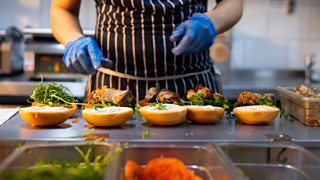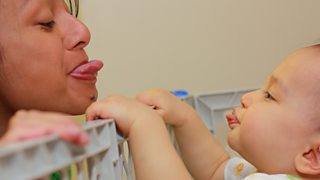The food that's bringing people hope during lockdown
With the UK in lockdown, community groups and volunteer services are finding ingenious solutions for helping others during the Covid-19 outbreak – very often, through food. In The Food Programme Sheila Dillon and Dan Saladino hear from some of the inspirational food heroes helping to feed those in need – from the ill and elderly to medical staff on the front line – and look at how these strategies could help change our food system for the better in the future.
The home cooks
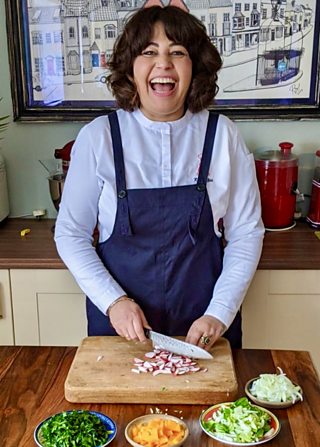
Across the country, individuals are cooking up storms in home kitchens, batch prepping meals for the nation’s needy. Romy Gill is a chef, author and food writer who used to have her own restaurant, but now she’s keeping busy by cooking for the NHS frontline staff in Bristol. “These are soldiers for us who are doing so much for all the people who are affected by this virus,” says the chef. A typical day might see her whipping up a red lentil dahl for 50 people. Romy is asthmatic so she isn’t leaving the house, apart from for walks in the evening, but her husband and a police officer who lives next door are helping to deliver the food, wearing protective clothing. “What better way to give people hope and comfort in their houses?” she asks. What better way indeed.
The mutual aid groups
Complete strangers are now linking up on social media to share ideas on how to get food around communities during this lockdown. One network making this happen is , a group of volunteers helping to coordinate the thousands of neighbourhood groups springing up, of which there are now more than 4000 around the country. One of the network’s founders, Aviah Day, explains the role her East London mutual aid group is playing. “One of the earliest things we needed to do was replenish the local food banks and we’re now having to explore getting hot food to people as well,” she says. Not everyone is in a position, especially if they’re very ill, to cook their own meals. “We have had a lot of contact from older people who can’t rely on their usual support structures,” says Aviah. “We’re also supporting people who have lost their jobs and don’t have the money to get food.”
Helping the homeless
Social Bite is a social enterprise with a chain of cafés throughout Scotland and a restaurant in Edinburgh. They work with homeless people by offering them jobs in the business and free food when they come into the cafés and restaurant. Like many hospitality businesses up and down the country, they’ve had to close for trading but, knowing their homeless clientele would be amongst the most vulnerable during the Covid-19 crisis, they knew they needed to take action. “What we decided to do was basically repurpose our entire organisation to create a massive free food delivery service for homeless people and for other vulnerable groups,” explains co-founder Josh, from the kitchen where staff are preparing 4000 emergency food packs. These parcels are sent out into the hands of homeless people, and others in really desperate food poverty, throughout Scotland.
The repurposed school kitchens

With schools and colleges closed across the country, there are many large kitchens going unused. The school kitchen at Washingborough Academy in Lincolnshire would normally be supplying 150 plus meals to children every day. They’re still supplying food to key worker children but they’ve adapted and are now doing something else for the community too – a daily lunch for the over-70s who are self-isolating. “We decided that they needed that security of getting a good, freshly cooked meal,” says headteacher Jason O’Rourke. Harold, one local 87-year-old benefiting from the service, even used to go to the school himself – back in 1937.
The food banks
With schools closed, children of low-income families, dependent on free school meals, have been hit hard by the lockdown. One organisation addressing this is , a food bank in South Tyneside. On a day-to-day basis they usually serve those less fortunate in the community with food parcels, but in lockdown they’ve also focused in on the local children in need. “At the moment, with the virus, it’s full-steam ahead,” says Angie Comerford, who co-runs the service. “We’ve got going out the door, on a daily basis, at least 120 pack lunches to the children who are usually on free school meals.” She says they have an amazing team behind them: they’re “loaded up” with school teachers and even have a pilot helping out. “Thank the lord for the community that we’ve got behind us,” says Angie. “If it wasn’t for them, we couldn’t keep up with the demand.”
A larder in a phone box
In a village called Muthill in Perthshire, a red phone box has been turned into a larder. If residents have extra food, they can leave some there, and if they need supplies for themselves or a neighbour, they can help themselves to what’s on the shelf. As well as helping the hungry it’s preventing people from having to make any unnecessary journeys outside the village. And it’s put the small Scottish community on the map.
Feeding the NHS
In-house catering teams that were able to provide meals for staff as well as patients have been largely lost from our hospitals, over many years of cost-cutting. But, as well as hundreds, even thousands, of cooks and chefs stepping in and preparing meals for hospital staff, some of the big food brands are also switching their energy to feeding nurses and doctors. Feed NHS is a not-for-profit campaign set up by Matt Lucas, Damian Lewis, Helen McCrory and the food chain LEON. “We’ve established this fundraiser called Feed NHS where we are one of the operators then using that money on a completely cost basis,” explains LEON’s co-founder John Vincent. Their teams are making 200 meals an hour, per restaurant, and constantly shipping it to London’s hospitals. “The vision for Feed NHS is to allow the critical care teams who can’t even stop to take their protective gear off to have at least one hot meal a day.”
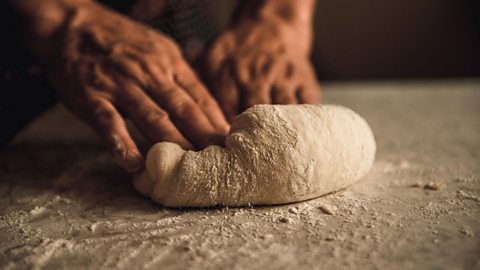
Why is there no flour?
The baking shelves at supermarkets have remained relatively bare.
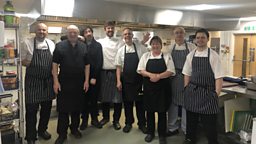
Lessons for the future
With everything we’ve learnt about how to feed ourselves and each other, will there be positives to come out of this crisis?
I would really hope that once all of this crisis is over that we maintain some of that community spirit, that we maintain that idea that we can support each other locally.Aviah Day
Aviah believes that the thousands of new grass-roots community groups have proved something amazing: “Given the opportunity to give something to someone else who needs it, people generally do,” she says. “I would really hope that once all of this crisis is over that we maintain some of that community spirit, that we maintain that idea that we can support each other locally, because actually the vulnerable people who were isolated and neglected were so before coronavirus hit.”
Kath Dalmeny is the chief executive of Sustain, an alliance of food and farming organisations that have been working to improve food in the UK for more than twenty years. “What I would hope for, coming out of Covid-19, is that when we’ve created a ‘meals on wheels’ service that helps elderly and isolated people to stay well fed, that we carry on doing that,” she says.
And there are other things that Kath hopes will emerge from the crisis: people having adequate money to buy the food they need, the cooking skills to use the food around them in a flexible way in any type of crisis, decent school meals, and an appreciation of farmers as the key workers who keep us fed every day of the year.
More from Radio 4
-
![]()
The Food Programme: Love In The Time Of Corona
Stories of community support through food
-
![]()
Seven tips for staying happy during lockdown
Dr Beth Healey specialises in advising on staying happy and healthy in isolation.
-
![]()
Iconic food moments in film
A smorgasbord of memorable moments the combine fine dining with unforgettable films.
-
![]()
The art of raising a creative child
What does it take to make creativity a life skill?
